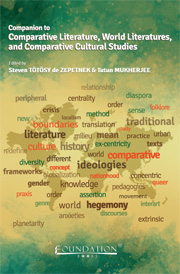Book contents
- Frontmatter
- Contents
- Introduction to the Companion to Comparative Literature, World Literatures, and Comparative Cultural Studies
- PART 1 Theories of Comparative Literature, World Literatures, and Comparative Cultural Studies
- The Contextual Study of Literature and Culture, Globalization, and Digital Humanities
- Comparative Literature and Ex-centricity
- Possibilities and Limits of Comparative Literature Today
- Comparative Cultural Studies and Pedagogy
- Teaching World Literatures
- Comparative Literature and the History of Literature
- Meltzl de Lomnitz, Comparative Literature, and Philosophy
- Comparative Cultural Studies and Cultural Anthropology
- Comparative Literature and Interart Studies
- Gender and Genre in Comparative Literature and (Comparative) Cultural Studies
- Comparative Cultural Studies and Translation Studies
- Comparative Cultural Studies and the Study of Medieval Literature
- Comparative Cultural Studies and Linguistic Hybridities in Literature
- Comparison and Postcoloniality
- (Inter)mediality and the Study of Literature
- PART 2 Comparative Literature in World Languages
- PART 3 Examples of New Work in Comparative Literature, World Literatures, and Comparative Cultural Studies
- PART 4 Multilingual Bibliography of Books in Comparative Literature, World Literatures, and Comparative Cultural Studies
- Index
Comparative Literature and the History of Literature
from PART 1 - Theories of Comparative Literature, World Literatures, and Comparative Cultural Studies
Published online by Cambridge University Press: 05 April 2014
- Frontmatter
- Contents
- Introduction to the Companion to Comparative Literature, World Literatures, and Comparative Cultural Studies
- PART 1 Theories of Comparative Literature, World Literatures, and Comparative Cultural Studies
- The Contextual Study of Literature and Culture, Globalization, and Digital Humanities
- Comparative Literature and Ex-centricity
- Possibilities and Limits of Comparative Literature Today
- Comparative Cultural Studies and Pedagogy
- Teaching World Literatures
- Comparative Literature and the History of Literature
- Meltzl de Lomnitz, Comparative Literature, and Philosophy
- Comparative Cultural Studies and Cultural Anthropology
- Comparative Literature and Interart Studies
- Gender and Genre in Comparative Literature and (Comparative) Cultural Studies
- Comparative Cultural Studies and Translation Studies
- Comparative Cultural Studies and the Study of Medieval Literature
- Comparative Cultural Studies and Linguistic Hybridities in Literature
- Comparison and Postcoloniality
- (Inter)mediality and the Study of Literature
- PART 2 Comparative Literature in World Languages
- PART 3 Examples of New Work in Comparative Literature, World Literatures, and Comparative Cultural Studies
- PART 4 Multilingual Bibliography of Books in Comparative Literature, World Literatures, and Comparative Cultural Studies
- Index
Summary
Abstract: In his article “Comparative Literature and the History of Literature” Slobodan Sucur argues that the origins of comparative literature are tied to debates concerning the renewal of the notion of literature in the nineteenth century. Further, Sucur discusses literary periodization in the history of literature and concepts including transculturalism, based on past and recent work in the field. Following his discussion, he proposes a framework based on geometrical modeling as a possible solution that would bring together literary theory and comparative literature via the representation of a conceptual-stylistic-figural continuum through the dimensionality of geometrical models.
Introduction
The Pandora's Box of literary theory, with its many antagonisms and confusion, and with its potential to destabilize and threaten the presence of disciplines such as comparative literature, seems to have its origin in Romanticism, including Johann Wolfgang von Goethe's notion of Weltliteratur (on Goethe, see, e.g., Birus; Pizer; Sturm-Trigonakis). The theorizing of the early Romantic phase contains inconsistencies, and this discord may indeed have filtered down into modern debates about literary theory. Miroslav John Hanak focuses in his discussion of idealism and theory in early Romanticism on the discord and development present in Schelling's and Hegel's reactions to their respective philosophies and their reaction to Kant's and Schlegel's attempts to reconcile these contradictions.
- Type
- Chapter
- Information
- Companion to Comparative Literature, World Literatures, and Comparative Cultural Studies , pp. 88 - 99Publisher: Foundation BooksPrint publication year: 2014

